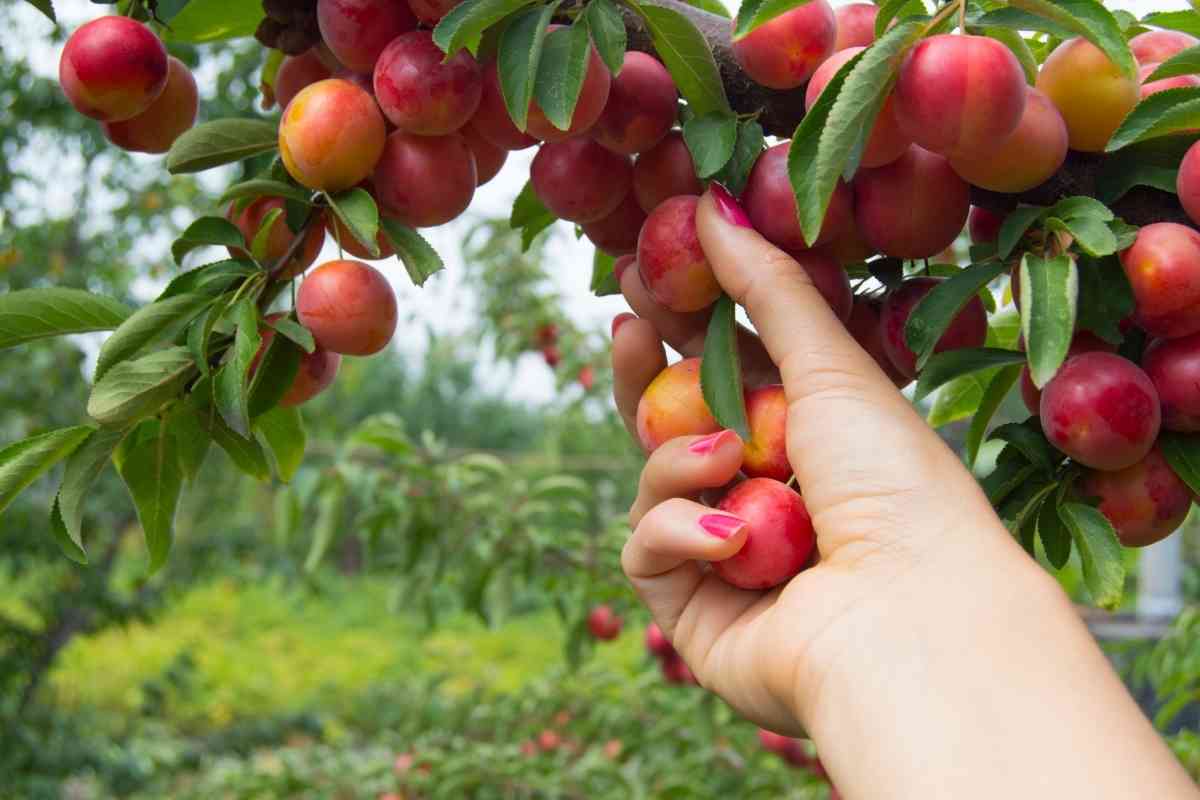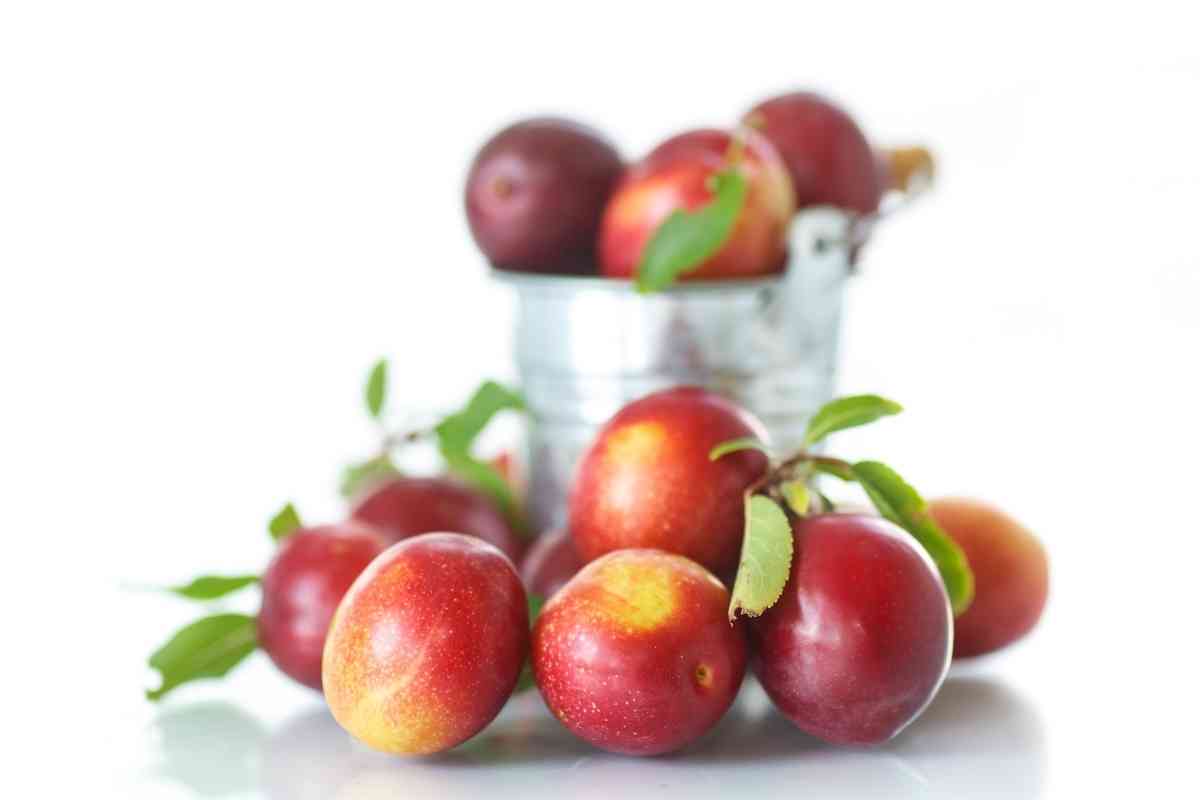Can Dogs Have Cherry Plums? Pros And Cons
Dogs have a habit of sinking their teeth into our food, and cherry plums aren’t an exception. But can dogs eat cherry plums?
Cherry plums are a type of stone fruit that is closely related to apricots and plums. They have a tart, acidic flavor that is often used in pies and jams. Cherry plums are native to Europe and Asia. The fruit is small, round, and typically red or purple in color. The skin of a cherry plum is thin and delicate, so they are often eaten whole, with the skin intact. Cherry plums are an excellent source of vitamins and minerals and contain high levels of antioxidants.

Can Dogs Eat Cherry Blossoms?
Dogs should not eat cherry plums. While cherry plums contain calcium, phosphate, and many healthy vitamins, they belong to a family of fruits that produce hydrogen cyanide, which can cause respiratory issues in dogs. Moreover, the pits in cherry plums are a choking hazard for canines.
If you must feed your dog cherry plums, only give them a small amount. Also, ensure the dog doesn’t eat the pits or the seeds. It is in your best interest to consult a vet before adding anything to a dog’s diet, be it cherry plums or anything else.
As dog owners, we will break down the pros and cons of feeding cherry plums to your dogs so you’re able to make an informed decision.
Healthy Nutrients Found in Cherry Plums
Calcium
Calcium is an important mineral for all dog breeds. It helps to form and maintain strong bones and teeth, and it also aids in nerve and muscle function. In addition, calcium helps to regulate blood clotting and heart rhythm.
Because calcium is so important for overall health, many commercial dog foods are fortified with calcium supplements. However, calcium is not only found in supplements; it is also found naturally in some foods.
For example, calcium-rich foods such as Swiss chard, spinach, and kale can be a healthy addition to your dog’s diet.
So, if you’re looking for ways to boost your dog’s calcium intake, be sure to add some of these nutrient-rich foods to their bowl.
Phosphate
Dogs need phosphate in their diet for many reasons. It helps keep their bones and teeth healthy and plays a role in muscle contraction and nerve function. Phosphate is also important for keeping the proper balance of fluids in the body.
Most dogs get the phosphate they need from their food, but some may need supplements if they are not getting enough from their diet. Phosphate supplements are available in many different forms, such as tablets, capsules, and powders.
If you think your dog might need a phosphate supplement, talk to your vet before giving them one.
Potassium
Potassium is an electrolyte that helps maintain fluid balance in the body. It is also necessary for muscle contractions, including the heartbeat. Potassium levels can become depleted due to illness, vomiting, or diarrhea.
When this happens, it’s important to replenish potassium levels to prevent serious health problems. Potassium supplements are typically given to dogs when they are sick or have had surgery.
Potassium can also be found in some foods, such as bananas, sweet potatoes, and spinach. So if your dog isn’t feeling well, a little potassium might be just what the doctor ordered.
Vitamin C
Vitamin C is important for dogs because it helps to boost the immune system, improve cardiovascular health, and promote wound healing. Many people think that dogs can get all the vitamins they need from their diet, but this isn’t always the case.
Just like humans, dogs can benefit from taking a vitamin C supplement. The recommended dose for dogs is about 25 mg per pound of body weight.
Vitamin C is safe for most dogs, but if you’re unsure whether or not your dog should take a supplement, it’s best to check with your veterinarian first.
Vitamin B Complex

Dogs need a well-balanced diet to stay healthy, and vitamin B complex can play an important role in maintaining their health. Vitamin B1, or thiamine, helps to convert food into energy, while vitamin B2, or riboflavin, helps the body to break down fats and proteins.
Vitamin B3, or niacin, aids in the digestion of food, and vitamin B6 helps the body to absorb nutrients. Vitamin B12 is essential for proper red blood cell formation, and folic acid helps to prevent birth defects.
All these vitamins are important for dogs, and a vitamin B complex supplement can help ensure that they get all the nutrients they need.
Cherry Plums Contain Hydrogen Cyanide
Cherry plums are a type of fruit that is related to cherries and plums. They are small and round, with bright red or purple skin. Cherry plums are often used in pies and jams and can also be eaten fresh.
However, cherry plums contain hydrogen cyanide, which can harm dogs if consumed in large quantities. Hydrogen cyanide interferes with the respiratory system, making it difficult for dogs to breathe.
In severe cases, it can even be fatal. For this reason, it is important to keep cherry plums out of your dog’s reach. Contact your veterinarian immediately if you think your dog has eaten a cherry plum.
Pits and Seeds Are a Choking Hazard
Cherry plum pits and seeds are a choking hazard for dogs. The pits can lodge in your dog’s throat, and the seeds can get stuck in their digestive tract.
If your dog ingests a large amount of cherry plum pits or seeds, it could also experience an intestinal blockage. Symptoms of intestinal blockage are diarrhea, vomiting, loss of appetite, abdominal pain, and constipation.
If you think your dog has ingested cherry plum pits or seeds, take them to the vet immediately. Treatment will likely involve surgery to remove the obstruction. So, while cherry plums may be a delicious treat for humans, it’s best to keep them away from your furry friend.
Symptoms of Plum Poisoning in Dogs
Plum poisoning in dogs is a very serious condition that can be fatal if not treated immediately. The most common symptom of plum poisoning in dogs is vomiting, which can lead to dehydration and electrolyte imbalance.
Other symptoms include diarrhea, abdominal pain, and lethargy. If your dog shows any of these symptoms after eating plums, it is important to seek veterinary care immediately. Plum poisoning in dogs is often caused by ingesting the plum pit, which contains cyanide.
Cyanide is a poisonous molecule that prevents cells from using oxygen, causing them to die. If left untreated, plum poisoning can cause organ failure and death. Luckily, plum poisoning is easy to treat if caught early. With prompt treatment, most dogs make a full recovery.
As we have discussed above, the health benefits of cherry plums for dogs outweigh the risks. However, if your dog is fond of cherry plums, ensure they eat only the fleshy part. You must always remove the pits and the seeds.
If the dog has ingested pits and seeds, wait for some time and observe their reaction. If your dog exhibits unfavorable symptoms, it is better to take them to the vet immediately.